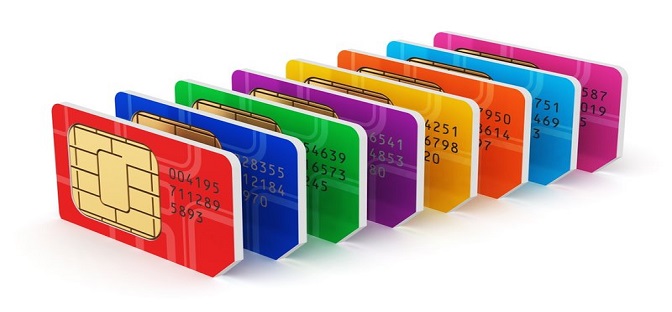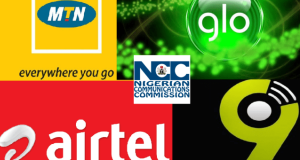Telecom
Telecom Market Recovers after SIM Bans Lifted

Nigeria, Africa’s largest market, has recorded modest growth in mobile subscriptions for the month of September, according to Centre for African Journalists (CAJ) News Africa.

Data from the Nigerian Communications Commission (NCC) indicates that active mobile lines and internet connections grew modestly, by 0,8 percent and 0,4 percent month-on-month (m/m) to 190,9 million and 140,3 million respectively.
The growth in September marks the second consecutive month of uptick, after a steady drop in subscriber numbers which started in November 2020 due to new customer identification registration requirements by the industry regulator.
Sales of new SIM cards were also temporarily halted by the NCC.
“The m/m increase in subscribers’ numbers reflects the easing of the regulator’s ban on new SIM in April ’21,” FBN Quest Capital stated.
It added the fortunes of the two major operators, Airtel and MTN were not been adversely affected by the loss of subscribers.
The pandemic is seen as having had positive impact on the earnings of network operators through increased data adoption and exponential data use for remote working and other applications such as entertainment and gaming.
After about two years of deadlock, last week, the Central Bank of Nigeria granted Airtel and MTN approval-in-principle for their mobile money payment services.
Both firms must wait for final approval from the apex bank before launching full-fledged operations.
Efina reports that 36 percent of Nigerians are still financially excluded.
Thus FBN believes the approval is a significant step toward driving mobile payments and reaching the CBN’s financial inclusion goal.
Telecom
Telcos Generated N5.3 Trillion Revenue in 2023 – NCC

Telecommunications operators in Nigeria generated N5.3 trillion in revenue from their services in 2023, according to the Nigerian Communications Commission (NCC).

This was disclosed in the NCC’s 2023 year-end performance report titled “2023 Subscriber/Network Performance Report,” released early this week.
The report detailed revenue contributions, with GSM operators earning N4 trillion; fixed wired operators generating N273.01 million; Internet Service Providers (ISPs) earning N89.81 billion; Value Added Service Providers (VAS) contributing N14.56 billion; collocation and infrastructure sharing players bringing in N1.14 trillion; and other operators generating N41.84 billion.
The NCC highlighted a rise in active subscriptions, which grew from 222.57 million in 2022 to 224.71 million by December 2023, while data consumption exceeded 713 terabytes.
The telecom sector’s contribution to Nigeria’s GDP increased from 13.55% in 2022 to 14% in 2023.
Capital expenditure (CAPEX) in the sector reached N990.55 billion, reflecting robust domestic investments.
Meanwhile, operating costs among telecom operators amounted to N3.16 trillion.
However, the report noted a decline in foreign direct investment (FDI) into the sector, which stood at $134.75 million in 2023, compared to $399.91 million in 2022, according to data from the Central Bank of Nigeria.
Year-on-year, active voice subscriptions grew by 0.96%, with an increase of 2.14 million new subscriptions recorded in 2023.
The NCC emphasized the continued growth and financial performance across all segments of the telecommunications market during the year under review.
Telecom
FG Blames Telecoms Tariff Hike on Global Inflation, Operational Cost

Bosun Tijani, minister of Communications, Innovations, and Digital Economy has attributed the recent increase in tariffs by mobile network operators (MNOs) to the global inflation and rising cost of operation.

Bosun Tijani, minister of Communications, Innovations, and Digital Economy
Tijani said this while briefing journalists after a closed-door budget defence session with the National Assembly’s Joint Committee on Information, Communication and Technology on Tuesday in Abuja.
He noted that telcos have struggled with high operation cost for several years in addition to global inflationary pressures.
The minister stated that the government was committed to ensuring the sustainability of telecommunication sector and protection of Nigerians’ interest.
“The hike in price is based on inflation globally. This is a sector that has not increased prices for a long time, what the government has been doing is managing the situation. They have been crying out for a long time that they are struggling with the cost of diesel. This is not a problem that is unique to Nigerians.
“We will ensure that MNOs can continue to deliver the best quality services to the people,” adding that “the Nigerian Communications Commission (NCC) is doing a lot of tracking now to ensure that the quality of the services that people will get is of good quality.”
Telecom
MTN Nigeria Says 50 Percent Tariff Wike will Services

MTN Nigeria has said that the approval of a 50 percent tariff adjustment for telecommunications companies (telcos) will go a long way to improving the country’s critical infrastructure and services.

Karl Toriola, the chief executive officer (CEO) of MTN Nigeria
In a statement on Tuesday signed by Uto Ukpanah, company secretary, and published on the Nigerian Exchange Limited (NGX), MTN Nigeria said the adjustment will empower millions of people and businesses and contribute to the country’s overall economic development.
On December 30, 2024, the Association of Licensed Telecommunications Operators of Nigeria (ALTON) warned that its members might begin shedding services if urgent action is not taken to review tariffs, as the Nigerian telecommunications industry is facing critical challenges.
Also, on January 1, the Association of Telecommunications Companies of Nigeria (ATCON) asked the Nigerian Communications Commission (NCC) to review call tariffs upwards by the first quarter of 2025.
Two days later, Karl Toriola, the chief executive officer (CEO) of MTN Nigeria, said telcos wanted a 100 percent increase in tariffs.
However, on January 20, the NCC approved a 50 percent tariff increase — the first hike in 12 years.
Addressing the adjustment, MTN Nigeria said it is a “significant milestone in ensuring the long-term sustainability of the telecoms industry, supporting the country’s critical infrastructure and services”.
On his part, Toriola said the tariff increase represents an important step towards addressing the impacts of the prevailing economic challenges on the business and industry.
“We deeply appreciate the Federal Government of Nigeria, the Honourable Minister of Communications, Innovation and Digital Economy, the NCC and our industry bodies for their continued support in ensuring the telecoms sector remains sustainable,” he said.
“This tariff adjustment represents an important step towards addressing the impacts of the prevailing economic challenges on our business and industry.
“It will enable us to maintain the critical investments required to deliver reliable, high-quality services to Nigerians.”
Toriola said the company remains committed to supporting Nigeria’s digital transformation agenda and driving inclusive growth for all stakeholders.

 News3 days ago
News3 days agoSERAP Petitions Trump, Urges Recovery of Stolen Nigerian Assets, Barring Corrupt Officials from US

 News3 days ago
News3 days agoNigeria’s Electricity Exports Hit $112m amid Persistent Power Outage

 Telecom3 days ago
Telecom3 days agoSubscribers Reject Tariff Hike, Say FG Cannot Speak for Them

 E-Financial3 days ago
E-Financial3 days agoOver 562m People Own Cryptocurrency Globally

 Telecom3 days ago
Telecom3 days agoMTNN Raises N42.20Bn through Commercial Paper

 Telecom2 days ago
Telecom2 days agoTelecom Tariffs Set to Rise by 50 Percent as NCC Approves Adjustments

 General News3 days ago
General News3 days agoNIS Announces Maintenance on Passport Portal

 E-Financial3 days ago
E-Financial3 days agoSEC Sets January 31 Deadline for CMOs Registration Renewals























